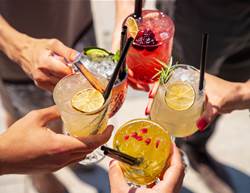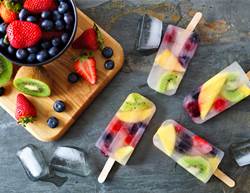Move over, Gatorade. There’s a new addition to the sports drinks category: pickle juice. For real.
Yep, the drink is having a total mainstream moment. Instead of downing the liquid from a jar of pickles, you can buy the brine itself in bottle-form.
If pickle juice sounds unappealing, we hear you. But fans of the stuff swear that it can ward off muscle cramps and replenish their electrolyte levels after a sweat-inducing workout.
And it's not just hardcore athletes drinking it. Pickle juice is also finding its way into cocktails, ice cream, and even slushy drinks.
Intrigued? Grossed out? Curious as to how it might work? Here’s what science has to say about the drink-including whether it can offer up any health benefits.
Why are people drinking pickle juice?
The habit is more popular among football players and other professional athletes than it is among, say, weekend warriors or casual gym goers. Some people say that the sodium in pickle juice can reduce the risk of muscle cramping, says dietitian Tara Gidus Collingwood. (We lose sodium, an electrolyte, when we sweat.) Plus, she says, it’s thought that the vinegar in pickle juice somehow works with the nerves to reduce pain.
So, does it actually work?
“The benefits are more anecdotal than anything,” says dietitian Leslie Bonci. “There are very few studies looking at this and they are very small, in terms of the number of participants.”
For example, a study of 12 people published in the journal of Medicine & Science in Sports and Exercise found that drinking small amounts of pickle juice was able to alleviate electrically-induced muscle cramps, whereas drinking water did not. But another study of 13 exercisers, which was published in 2014, found that drinking pickle juice didn’t fully replace the sodium, potassium, or fluid that was lost from exercise-induced sweating. That conclusion? Drinking pickle juice “may be ineffective at alleviating exercise-associated muscle cramps by replenishing electrolytes,” according to the researchers.
Part of the problem is that muscle cramps can have more than one trigger, says Bonci. “In some [other studies of people with muscle cramps], their blood sodium levels and even hydration levels were absolutely fine,” she says. “A lot of what causes those nerves to spasm is still unknown.”
Still, Bonci says, if someone says that they feel better after drinking pickle juice, “you can’t discount that.”
Are there any other reasons I should start drinking pickle juice?
Pickle juice can help replenish your fluid levels-it is part water, after all. And it doesn’t contain any sugar. But unless you need a little extra sodium in your diet-and most of us don’t-there’s no real reason to start loading up your shopping cart.
Of course, you may find that you actually enjoy the taste of pickle juice. “There are athletes that really don’t like eating [sweet sports drinks and chews] all the time,” says Bonci. “Maybe the taste is nice because it’s different.
“People either love the taste of pickle juice or they can’t stand it,” she says. “There’s no in between with this.”
Are there any reasons why I shouldn’t drink pickle juice?
If you’re salt sensitive or are trying to limit your sodium intake, you might want to avoid it, says Gidus Collingwood. “Most people have a diet that’s pretty high in sodium, so we don’t necessarily need to go seeking it out,” she says.
Another suggestion: Instead of drinking the juice, “just eat the pickle,” says Bonci. “It’s a cucumber, so you’re eating vegetables and getting the potassium, which you’re not going to get if you just have the brine.”
(Want to pick up some healthier habits? Sign up for FREE to get healthy living tips, weight loss inspiration, slimming recipes and more delivered straight to your inbox!)










